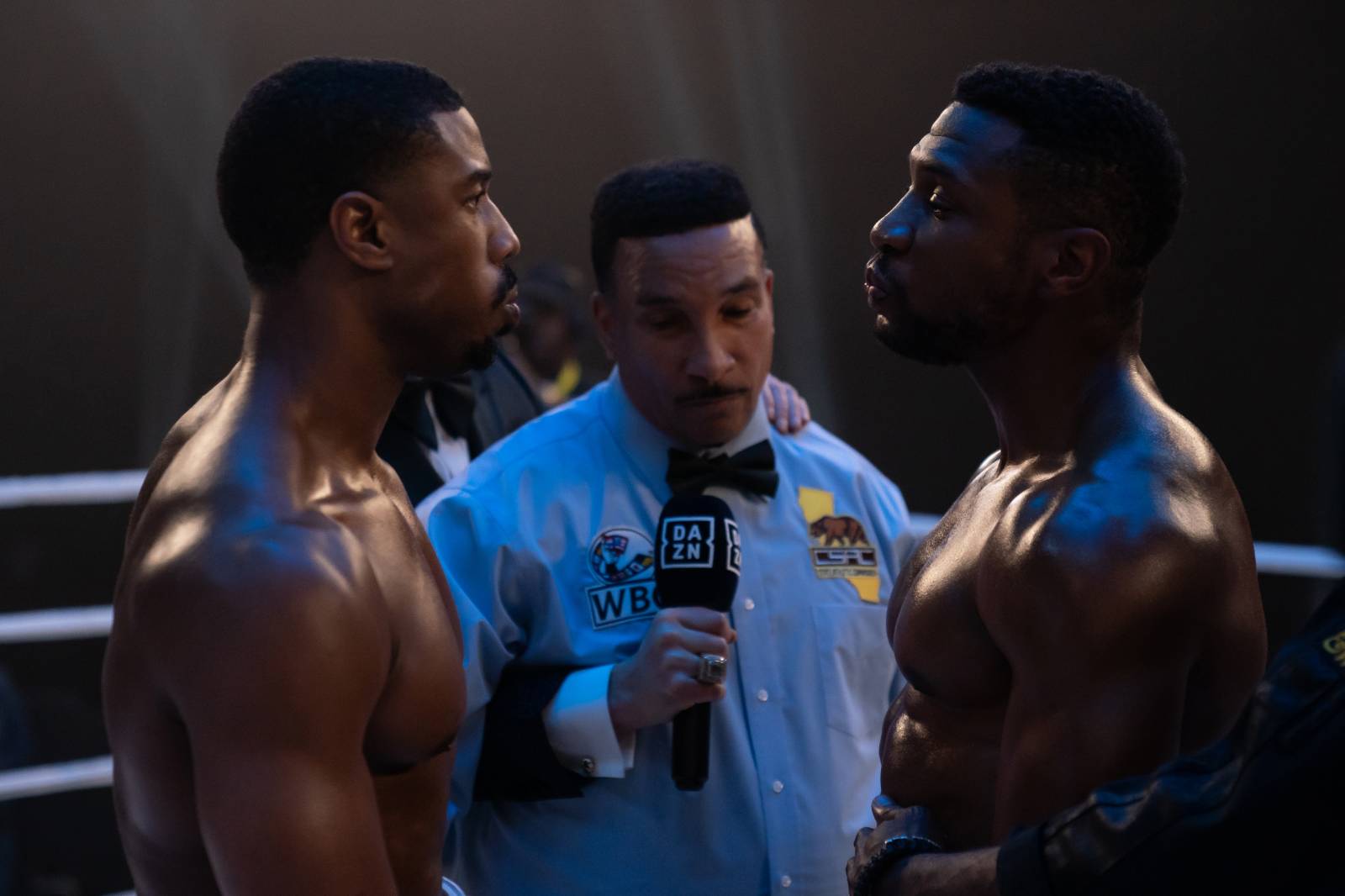Just to get it out of the way: the first Creed is the best Rocky film. They share the same formula, a foundation no doubt solidified by the ‘70s sports classic, but Ryan Coogler perfected it to shape a framework that would become emblematic of so many lega-sequels thereafter. The backslide of a follow-up, Creed II, seemed to trade fully in nostalgia, and leaning so hard into the Rocky IV of it all felt cheaper in comparison. A safety net. In such terms Creed III’s success may hinge on a viewer’s love for the Rocky franchise overall. For devotees, Sylvester Stallone’s absence as the Philly icon may leave something of an emotional vacuum. For those unattached, especially following a Drago-heavy part II, it’s almost immediately apparent how liberating Rocky Balboa’s vacancy is. A third installment (or ninth, depending on who’s counting) can be hard to narratively justify in any franchise, let alone one where the legacy character decides to uncharitably bow out. But star and first-time director Michael B. Jordan uses newfound free space to his advantage. Haymakers and uppercuts aren’t the only bold swings taken here. If Creed is the best of the Rocky films, Creed III works because it’s barely a Rocky film.
Reintroducing a young Adonis “Donnie” Creed well in the care of his stepmother, Mary-Anne (Phylicia Rahsad), the film’s first moments have him out after hours, sneaking around amateur boxing fights with “Diamond” Damian Anderson (Spence Moore II). Dame is a boxing prodigy with a take-no-prisoners mantra; his sights set on greatness. Before too long the pair find themselves in an Angels with Dirty Faces situation, their lives diverging after a fateful run-in gone wrong. In the present day, Donnie and Bianca (Tessa Thompson) relish in raising their daughter while wrangling the new, quieter phase of their respective careers: Donnie as a retired champ promoting a new generation of fighters, Bianca as a music producer, having acquiesced stage life to her hearing loss.
The setup of idyllic life is one of the more charming things about the film. In a plea for easy drama, a lesser version of Creed III would paint Donnie as someone itching for the ring amid domesticity. Jordan instead understands that the best boxing films are all about the build. Despite a few brief moments where some soft beats fall flat, he handles the tranquil family dynamic with refreshing patience and knows to give you a taste of serenity before Dame (now Jonathan Majors) returns from an 18-year prison stint to open old wounds in a quest for unlived boxing glory. From there, Creed III moves at a deliberate pace, taking its time to muse on the guilt and resentment stirred up when a road is not traveled, and that requires a measure of restraint not always present in first-time filmmakers.
Michael B. Jordan may boast a marquee physique, but even behind the camera he exudes a star-like confidence. After the opening flashback he treats us to Donnie’s final fight before retirement, a boxing showcase as assuredly directed as anything else in the genre, perhaps with even a bit more flair. His command of both the timing and blocking integral to action prove he’s got the goods. Early on the scene feels like a promise: he may be green, but you’re in good hands. What’s more, Jordan acknowledges Majors as the main event here, giving the actor adequate room to wring every ounce of tender sympathy and boiling menace from Dame. Majors’ ability to oscillate between those two registers in a single line is evidence enough of his place as one of the most magnetic talents in Hollywood today.
Their ultimate clash comes impressively charged. Given the amount of groundwork required of this third outing, Dame rings true––as if he’s always been there, necessary to the closure of Donnie’s legacy. The bout pays out in both satisfying and unexpected ways, and it’s where Jordan makes some of his audacious choices as director. He executes all of the bone-crunching blows you’d expect in a boxing climax, composed enough to entertain but brazen enough to experiment. He toys with atmosphere at the most crucial points, and the result, in a few brief moments, is almost avant-garde. The dreamlike visual metaphors are decidedly blunt, but that they’re present at all in Rocky IX is like a gift. As the first sports film shot with IMAX cameras, Jordan’s decision to put them to use as tools for both an epic and ethereal canvas is well-considered.
Handily crafted and only occasionally stilted, Creed III is a remarkably limber piece of entertainment. In the face of Creed’s high watermark, Michael B. Jordan could have cautiously waded through his first foray into filmmaking with the safe crutch of the Rocky legacy. He elected to play a smarter hand, enabling the right tropes of the sports movie while subverting others. What he delivers is something slightly more nuanced and off-center than advertised. Creed III announces the potential end to a star-making role and the exciting birth of a promising director.
Creed III is now in theaters.

